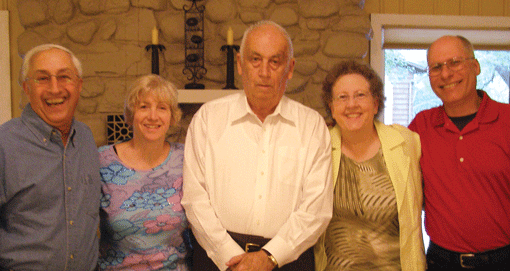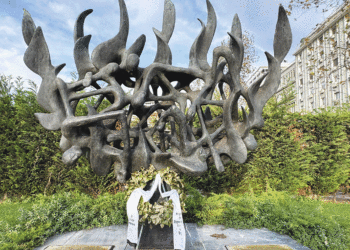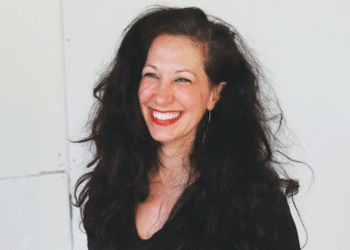By ERIN ELLIOTT BRYAN Community News Editor
A photo of Gloria Fredkove appeared in Life magazine — when she was just 18 months old.
Fredkove, of Minnetonka, had arrived in the United States in 1944. She came in the arms of her mother, Eva Bass, and was accompanied by her brother, Jack Bass (who now lives in St. Louis Park), and her maternal grandmother, Schewe Schleider (pronounced “Sheva”).
Fredkove and her family were part of a group of 982 European refugees from 18 different countries, most of them Jewish, who were rescued from Italy and brought to the United States as guests of President Franklin D. Roosevelt — an act that circumvented immigration quotas at the time.
The refugees were given shelter at Fort Ontario, a U.S. Army base near Oswego, N.Y., on the shores of Lake Ontario. Though each refugee had signed documents promising to return to Europe at the end of World War II, they were all allowed to remain in the United States and apply for permanent resident status.

Fredkove and her brother — who is 10 years older and has troubling memories of the war in Europe — had difficult childhoods, growing up in rundown buildings on the Lower East Side of Manhattan. Their grandmother had died, their single mother was ill and unable to work, and both Gloria and Jack relied on their survival instincts.
And they went through life thinking that they no longer had any extended family — until Fredkove received a phone call in February 2014. Fredkove said her reaction was “shock first, and then great excitement that I actually had another living relative.”
Fredkove had been contacted by Dr. Nancy Kushner, a dermatologist from Fort Meyers, Fla., who is Fredkove’s second cousin. Kushner determined that her paternal grandfather, Isaac (or Isadore), was the youngest brother of Fredkove’s maternal grandmother, Schewe.
Fredkove and Kushner exchanged e-mails for nearly a year. In January, Fredkove and her husband, Joe, as well as her brother Jack, met Kushner and her husband, Harold (also a doctor), in Florida. The Kushners then visited the Fredkoves in Minnetonka during the first week of June.
“I always felt a closeness with Nancy, I always felt a warmth from her from the beginning, even before I met her, just from the e-mails,” Fredkove said in a recent interview with the AJW at her home, with Bass and Kushner.
Fredkove said it has been interesting to learn from Kushner’s family research, but it’s also been difficult to absorb.
“When you’ve lived your whole life like that, thinking you have no relatives, and then all of a sudden somebody comes, it’s wonderful, but it’s also unsettling,” Fredkove said. “It stirs up all of this old stuff that’s been buried.”
Fredkove recalled the horrific experience of her mother, who was once a nightclub singer in Paris. It began when both Eva and her son Jack were imprisoned in Italy — where Fredkove’s grandparents had relocated before the war — on two separate occasions, simply for being Jewish. They were then sent to live in libero confino (“free confinement”) in Potenza, where Gloria was born.
The family was relocated to a rural village, which was later bombed, forcing Eva, her mother and the children to set out on a grueling 60-kilometer walk to reach the British lines. They were eventually selected for the group of refugees headed to Fort Ontario.
During the two-week voyage aboard an army transport ship, it’s rumored that Eva entertained her fellow refugees and the wounded soldiers returning home; but Gloria disputes that, saying her mother was too sick during the trip.
(Eva was actually pregnant during the voyage and gave birth to a baby girl at Fort Ontario; the child was adopted by a family in Buffalo, N.Y. Fredkove attempted to locate her, but learned that she died more than 10 years ago.)
Eva Bass was one of several refugees who testified before Congress, in June 1945, about her experience in Europe, which led President Harry Truman to allow those at Fort Ontario to apply for permanent resident status in the United States.
The Fort Ontario Emergency Refugee Shelter, also known as “Safe Haven,” was the first and only refugee center established in the United States during World War II; it is now the Safe Haven Museum and Education Center. A 1983 book, Haven: The Dramatic Story of 1,000 World War II Refugees and How They Came to America, was written by Ruth Gruber, who was the special assistant to Secretary of the Interior Harold L. Ickes and in charge of the Fort Ontario refugees — she is now 103.
Kushner has done most of her research through JewishGen.org, a free resource for Jewish genealogy. She has also visited the National Archives and U.S. Holocaust Memorial Museum in Washington, D.C., and has received documents from both Poland, where the Schleiders were from, and Italy.
Her research has also uncovered some Italian documents that could help Jack Bass’ application for reparations for his experiences during the war. Though, for him, he would prefer that his past stay buried.
“I’m a very private person. I had a mother who was very evasive about everything in life, so she passed that on to me,” Bass said. “Finding out who your family was, that’s all good and well from a historical point of view. As far as I’m concerned, what happened to me in Europe erased all possibilities of me trying to find out who I am and where I’m from.”
Though he endured a strained relationship with his mother, Bass said she did the “most decent thing” by bringing the family to the United States.
For Fredkove, the research that Kushner has done on the Schleider side of the family has provided new insights about her family and their lives before the war, particularly her grandmother Schewe.
“When Nancy told me that my grandmother was one of 11 children, that, to me, opened up a whole new way of understanding my grandmother,” Fredkove said. “She couldn’t have had a lot of attention as a child because there were so many other siblings there. And so she probably had a lot of responsibility in those days. My only memory of my grandmother is that she didn’t want to be around me.”
Kushner said she has been researching her family history for more than a decade.
“You’re either interested in genealogy or you’re not, I don’t think there’s any middle ground,” Kushner said. “Some people, rightly so, just feel ‘I am what I am and I’m going forward.’ But I think, historically, you can get some insights in terms of the psychology. Does it change anything? No, but I think it gives a little bit of closure on certain levels and why people acted the way that they did.”
Kushner’s grandfather, Isaac, the youngest, had left the family and immigrated to the United States in the 1910s, when he was just 19 years old. She was able to acquire his Social Security application from 1937, which listed his birth city as Jaworów — the Polish name for the city of Yavoriv that is now part of Ukraine.
Over the course of 10 years, Kushner obtained birth records for her grandfather and several of his siblings, including older sister Schewe. Researching that name, Kushner found Schewe Schleider’s official immigration document and a reference to Gruber’s book Haven, which included the story of Eva Bass and her young children, Joachim (Jack) and Yolanda (Gloria).
“I researched Yolanda Bass and up comes Gloria’s name because she had spoken at the University of Minnesota and there’s also records of her going to the [Fort Ontario] reunions. And her home phone number, there it was,” Kushner said. “Gloria picked up and I said, ‘I think I’m your second cousin’ and I gave her all of this information.”
Kushner has also located other second cousins and first cousins once removed. Ironically, she discovered that many of the first cousins lived in New York City during the postwar years, but were unaware of each other.
“Our three married children married into huge extended families and I kind of missed that,” Kushner said. “Genetics are interesting. You see some similarities, even though [Gloria and I] have had no physical contact for 70 years.”
Joe Fredkove said his wife has “contributed extensively to the community,” singing in synagogue and secular choirs, composing poetry and music for her grandchildren and writing plays (she earned a bachelor of arts degree in from Metro State University in 2002). She also speaks to school groups and is working on a memoir of her own personal experience.
“For me, my identity is wrapped up in my past, it’s part of my present and my future, but it’s also reflected in my past,” Fredkove said. “Psychology 101 will tell you that everybody wants to understand who they are. It’s a human curiosity to know who you are and where you came from and where your parents came from.”
(American Jewish World, 6.19.15)




















Comments 0